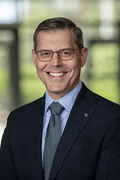
Charles B. Stevenson, MD
Leah Mindling Abrams Professor of Neurological Oncology
Professor of Clinical Neurological Surgery
Division Chief and Vice Chair, Pediatric Neurosurgery
- Address
-
GH 5100
SNEU
IN
Indianapolis, IN
Bio
I was first drawn to neurosurgery as a medical student during an elective rotation. It quickly became clear to me that taking care of people with neurological disorders was both incredibly challenging and immensely rewarding. I was hooked after the first day of the rotation.
During my neurosurgery residency training at Vanderbilt University, I was fortunate to find a mentor in Dr. Noel Tulipan, a pediatric neurosurgeon who was a pioneer in repairing spina bifida defects in fetuses to improve their outcomes following birth. He became a guiding presence in my life and inspired me to dedicate my career to caring for children.
I am board certified in both adult neurosurgery, from the American Board of Neurological Surgery, and in pediatric neurosurgery, from the American Board of Pediatric Neurological Surgery.
As a pediatric neurosurgeon, I specialize in the following conditions and procedures:
- Brain and spinal tumors
- Chiari malformations
- Craniosynostosis
- Endoscopic and minimally invasive surgery
- Hydrocephalus
- Spasticity surgery, including selective dorsal rhizotomy (SDR) and the implantation of baclofen pumps
- Spina bifida, including fetal surgery for myelomeningocele
- Spinal dysraphic defects and all forms of tethered cord syndrome
My philosophy of care is simple — the patient always comes first. I will take as much time as needed to fully explain a diagnosis and answer all of a family's questions. I base all of my recommendations and treatment plans on the straightforward principle that it is what I would want to be done for my own child.
I arrived at IU Health and the Riley Hospital for Children in 2025, after having practiced for 15 years at Cincinnati Children’s Hospital Medical Center. There I specialized in the treatment of children with brain and spine tumors, serving as the surgical director of the Brain Tumor Center. I also served as a member of the Fetal Care Team, helping to create the Fetal Myelomeningocele Surgery Program there in 2011. In addition, I developed and directed the Surgical Spasticity Clinic at Cincinnati Children’s, creating a multispecialty program to evaluate and treat patients with cerebral palsy and other conditions who are adversely affected by spasticity in their limbs.
I am proud to have been recognized twice with Distinguished Faculty Awards from Cincinnati Children's: first for my efforts as the surgical director of the Brain Tumor Center, and subsequently for my role as part of the multispecialty Trauma Services Team. In addition, I am honored to have been recognized by the Office of Patient and Family Experience at the end of 2019 as the highest-scoring surgeon at Cincinnati Children’s when graded by patients and their families on a hospital-wide survey. Finally, in 2025 I was honored with the Educator of the Year Award by the Department of Neurosurgery at the University of Cincinnati Medical Center.
At present, my research is focused on developing novel clinical trials to search for new treatments to improve outcomes for patients with malignant and recurrent brain tumors, as well as working to improve surgical techniques for intrauterine closure of myelomeningocele (spina bifida) defects to make the procedure safer for both mother and child. In addition, I serve as a principal investigator for the national Cerebral Palsy Research Network (CPRN), developing treatment protocols and quality improvement measures to help advance the care of individuals with CP.
When I’m not working, I try to spend as much time as possible with my wife and two young children. I am a fan of classic and alternative rock music, as well as the blues, and I enjoy attending concerts and learning about rock history.
| Year | Degree | Institution |
|---|---|---|
| 2009 | Fellowship | Cincinnati Children's Hospital Medical Center |
| 2008 | Residency | Vanderbilt University Medical Center |
| 2006 | Postdoctoral Training | Vanderbilt University |
| 2001 | MD | Vanderbilt University |
| 1997 | BS | Southern Methodist University |
Brain tumor therapy; clinical trials
Fetal surgery techniques and clinical outcomes
Treatments for spasticity and dystonia in individuals with cerebral palsy
- Brain and spinal tumors
- Chiari malformations
- Craniosynostosis
- Endoscopic and minimally invasive surgery
- Hydrocephalus
- Spasticity surgery, including selective dorsal rhizotomy (SDR) and the implantation of baclofen pumps
- Spina bifida, including fetal surgery for myelomeningocele
- Spinal dysraphic defects and all forms of tethered cord syndrome